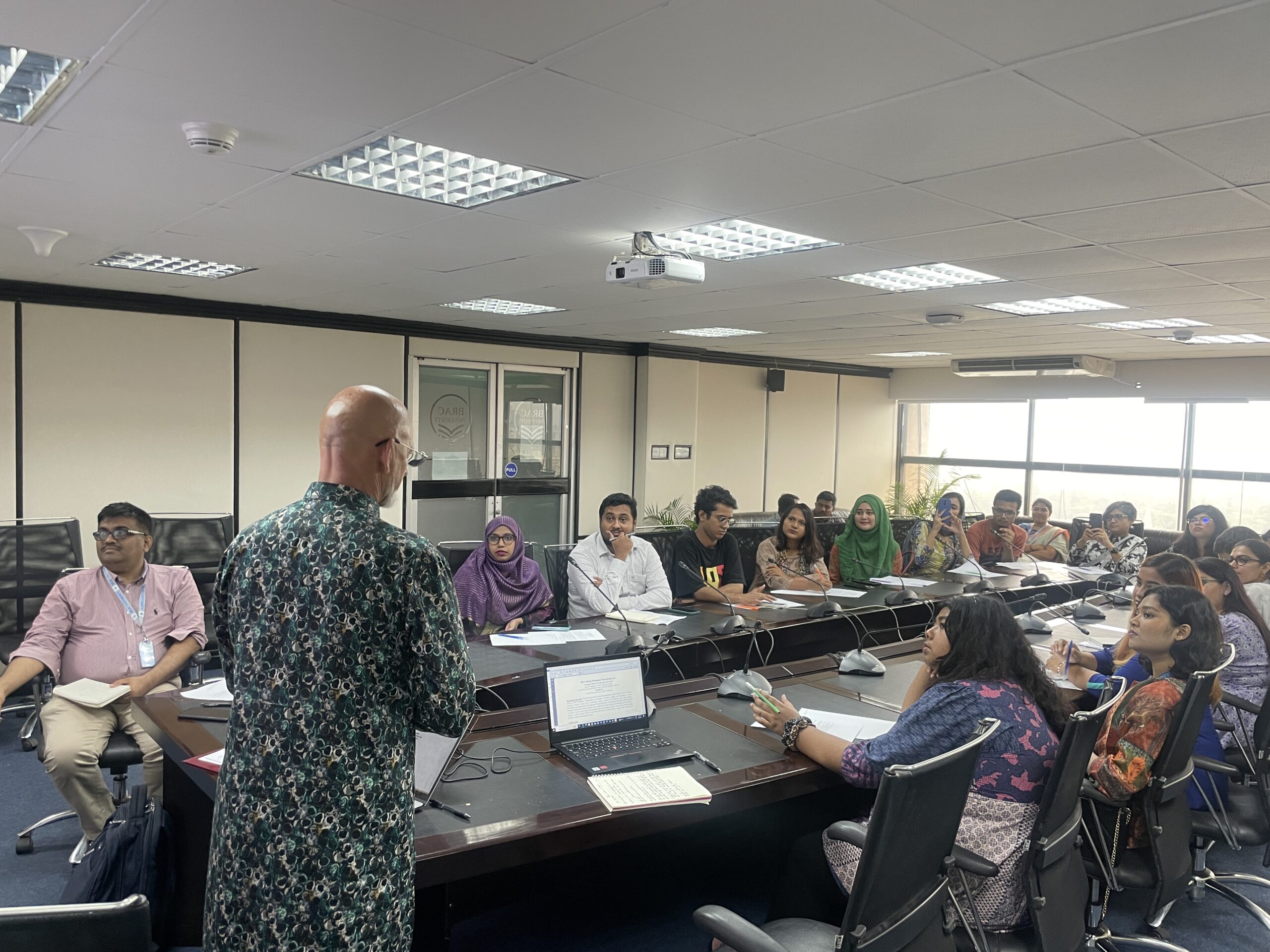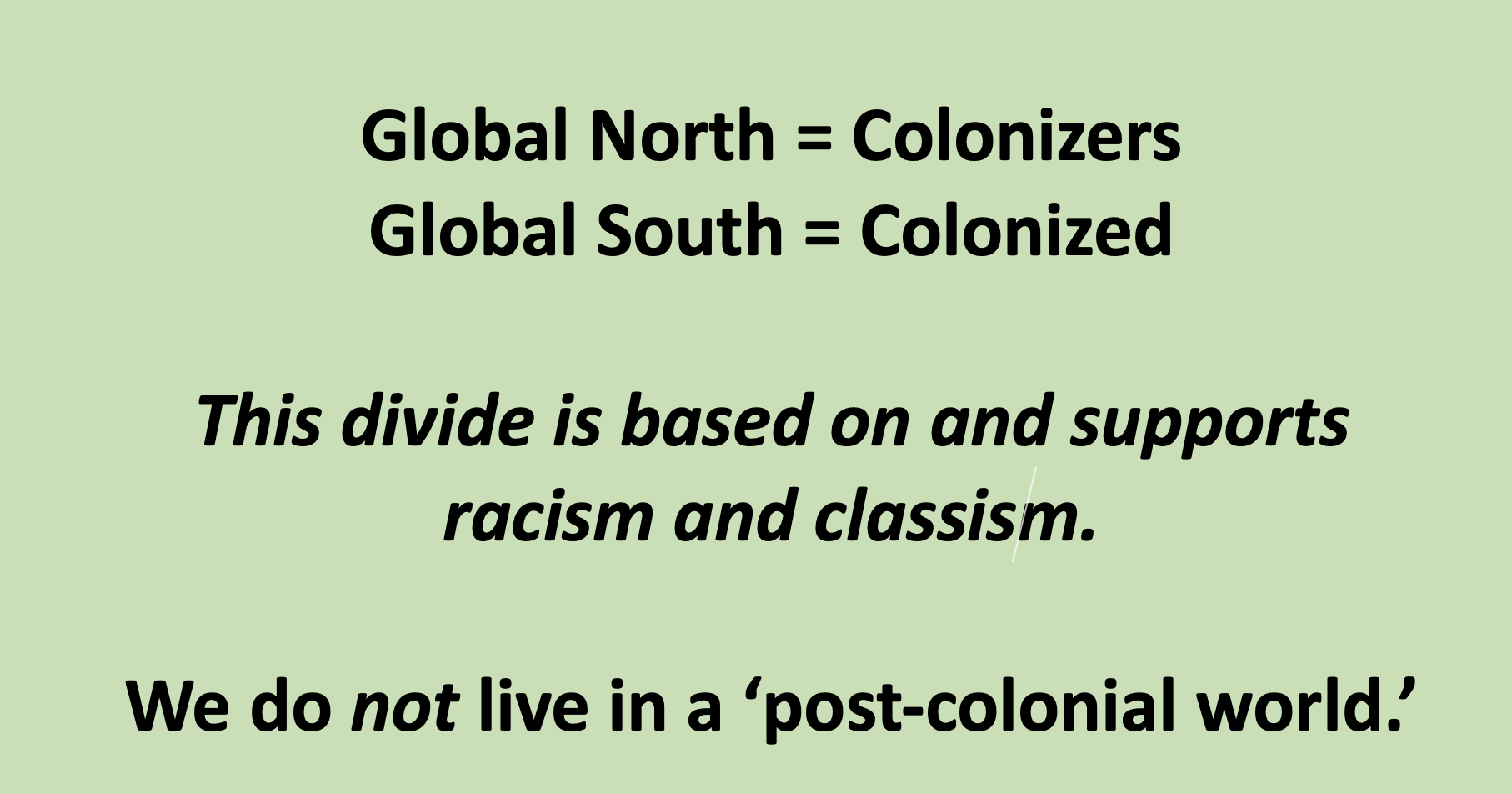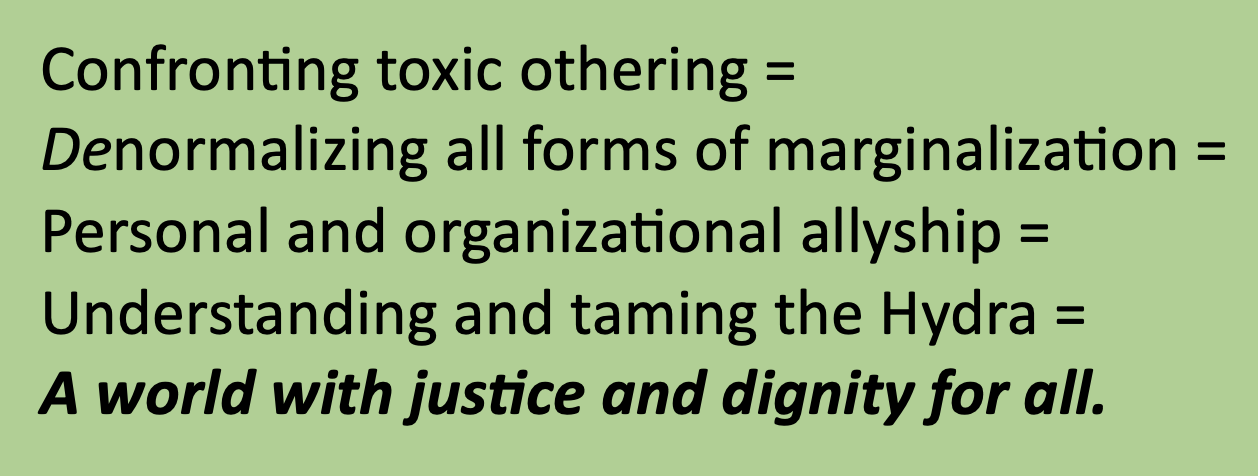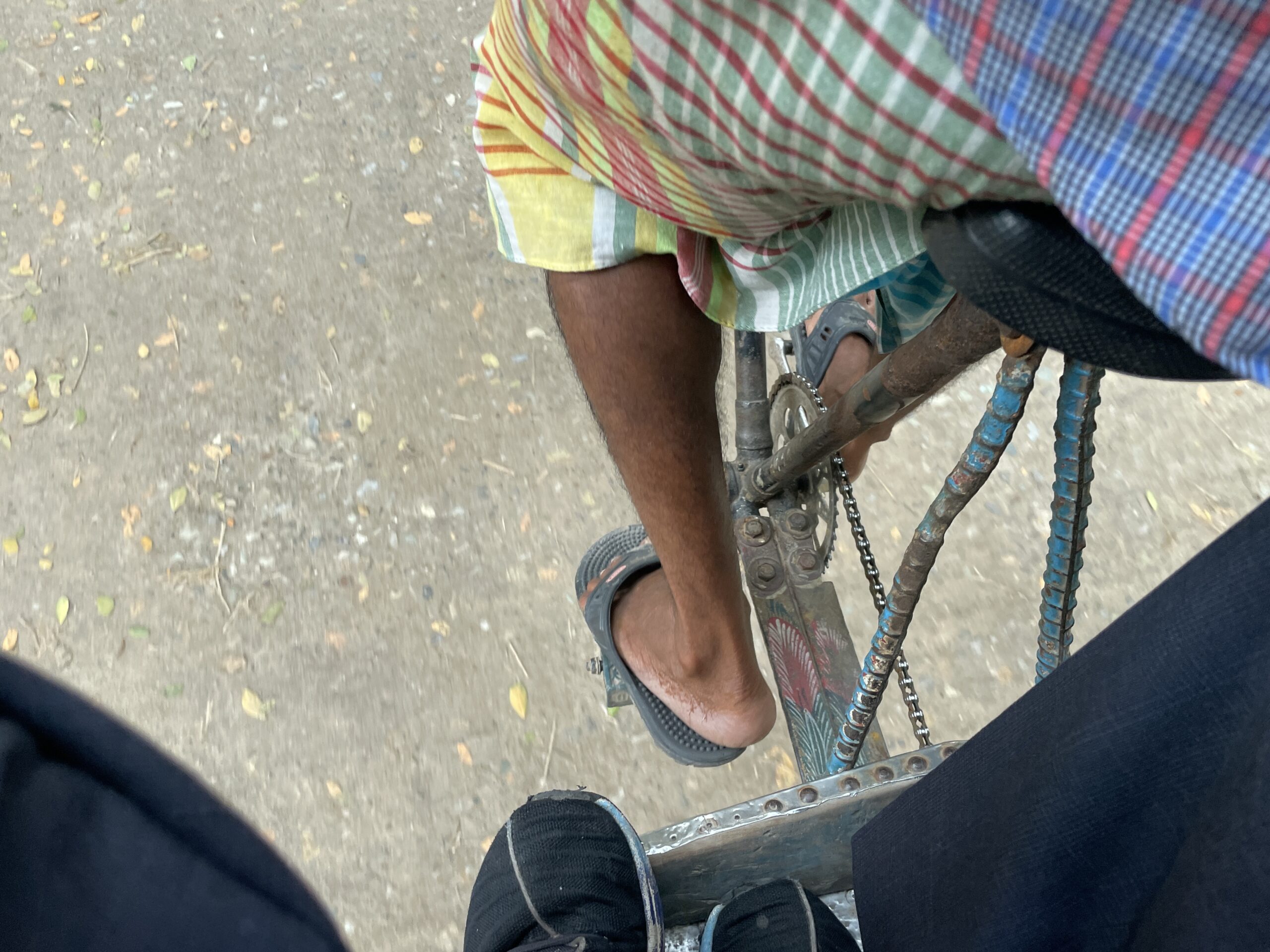Open letter to Women’s Peace Cafe attendees, Dhaka, Bangladesh 8 August 2023
Esteemed students, staff, faculty, and friends,
I have very pleasant and vivid memories of our short time together at the Women’s Peace Café last week. I found your attentiveness extraordinary, your questions on point and challenging, and your hospitality warming. Here is the article in The Business Standard reviewing our event.
During our conversation I believe several points I made resonated with many of you and also I gave you a couple assignments or challenges. Below I review and extend some of my main points. Additionally, you are welcome to read this which I wrote when I was in Cox’s Bazar at a three day workshop focusing on power, justice, and how to use the Hydra model to better understand global issues.
Listen to those who are marginalized
One of the first challenges I gave you was creating a list of marginalized people who have been inspirational to you. These names should include females, of course, but think also of other marginalized statuses.The premise that we must learn to hear the voices of those who are marginalized is one that is accepted and encouraged by leaders in the Critical Race Theory (CRT) movement in the United States. Those who want to be allies to the marginalized must listen to them and follow their lead. Here is a clarifying quotation from Paulo Friere, author of Pedagogy of the Oppressed:
inspirational to you. These names should include females, of course, but think also of other marginalized statuses.The premise that we must learn to hear the voices of those who are marginalized is one that is accepted and encouraged by leaders in the Critical Race Theory (CRT) movement in the United States. Those who want to be allies to the marginalized must listen to them and follow their lead. Here is a clarifying quotation from Paulo Friere, author of Pedagogy of the Oppressed:
“Although the situation of oppression is a dehumanized and dehumanizing totality affecting both the oppressor and those whom they oppress, it it the latter who must, from their stifled humanity, wage for both the struggle for a fuller humanity; the oppressor, who is himself dehumanized because he dehumanizes others, is unable to lead this struggle.” (Pedagogy of the Oppressed, page 47)
My list is exclusively women of color!, except in the case of American sociologist and activist Judith Butler, a ‘they’. These names represent only a short, suggestive list in terms of my personal development; my more complete list goes much longer. I would hope that you would take this challenge to construct your own list, keeping in mind that the best voices to listen to are those which have been marginalized. Who are the voices present in Bangladeshi culture speaking about their oppression? How can you learn from them?
We are one Humanity
A second main point I made was that we must move forward together based on the assumption no human is more human than any other human. I gave you my long, winded definition of humanism2, and I hope to challenge you to come up with your own definition that expresses how you feel about humanity and justice.
My ‘humanism’ definition is a work in progress which I have modified several times during my career. The world is changing rapidly, and the definition of what it takes to be a humanistic person who prioritizes humanity over nationality is always changing. Be prepared in the future to learn and revise your own definition.
On a related note, we also talked about how toxic othering is at the base of all the various ‘isms’ like racism, sexism, classism, colonialism, etc. We must always keep in mind that a humanitarian actor should never fight just one evil like sexism, for example, and not be prepared to be an ally to those who are fighting all the other isms.
The Hydra model is only one tool to use as you become a champion of humanity and embrace the challenge of understanding and responding to issues of diversity, equity, and inclusion (DEI). As a model, however, I think the
Hydra image is robust because it demands the integrating and understanding of all the dangers to humanity represented the the various heads and understanding the concept of intersectionality presented to us by Audre Lorde and Kimberlé Crenshaw.
I hope that you will use the model of the Hydra in the future as you attempt to understand more deeply your own life and the lives of people around you. Critical Race Theory and Critical Hydra Theory both use the word interrogate to describe their methodology in exploring the past, and understanding how racism -and the other isms- have been woven into institutions, laws, policies, and norms in our cultures.
I would like you to keep the word ‘interrogate’ in mind as you examine your own culture and your own life as you own your role as an advocate for humanity. Seek always to question basic assumptions and have the courage to speak truth to power.
Global south = colonized world
One small point I made had to do with the commonly used phrase the ‘Global south’. One way that marginalization becomes normalized is by using words to sanitize the past. Such is the case with the use of the phrases ‘Global north’ and “Global south.’ The use of these terms asks use to forget history and to acknowledge that the present world is very much a product of our colonial past. In no uncertain terms, Global north = colonizers and Global south = colonized. As I mentioned above, using Critical Hydra Theory demands we interrogate the past and understand how those in power have normalized marginalization. The colonialism/paternalism head of the Hydra is at the root of most global social problems. You are invited to read this and this where I explore this topic in some detail.
= colonized. As I mentioned above, using Critical Hydra Theory demands we interrogate the past and understand how those in power have normalized marginalization. The colonialism/paternalism head of the Hydra is at the root of most global social problems. You are invited to read this and this where I explore this topic in some detail.
Mother Earth and the the fight against anthropocentrism
We all have a tendency to put out the fire closest to us, or the one that is most immediately personal to us. Women fight sexism in their own lives, and in their culture, because that is an immediate and personal concern. But as I pointed out in my presentation of critical concern is the climate crisis. Right now Bangladesh is very much at risk due to the extreme climate episodes that we will see happen more and more frequently. In the future, cyclones will get stronger and flooding worse. The Hydra has many heads, but perhaps the most important one is anthropocentrism: the premise that humans are above and apart from nature, and can do with the natural world whatever we wish. There is no debate about the fact that human activity on the planet has caused and will cause increasingly massive climate related damage and will change peoples lives. If we do not integrate our quest for a better humanity with having a better relationship with nature, we are surely doomed. Those born now in 2023, unfortunately, will see a world of climatological collapse and massive devastation to humanity unless we all act with greater urgency now.
 Embrace the task
Embrace the task
Be humbled but also energized by the enormity of the task before us. Understanding all of the heads of the Hydra and seeing each intersectionally connected to the cancer of toxic othering is an important first step. I urge you to perform acts of allyship, and welcome and give positive reinforcement to those who offer allyship to you.
Let me give you another assignment. As I traveled around Dhaka, I had occasion more than once to ride in a human powered rickshaw. Next time you user this mode of transportation I would ask that you reflect on the extent to which you have been an ally to this person who is quite obviously near the bottom of the social class structure and is thus quite marginalized. What would it look like being an ally to this person? We always have to watch the line between allyship and simply patronizing, but that is a task that I feel, with the proper intentions and heart, can be accomplished.
an ally to this person? We always have to watch the line between allyship and simply patronizing, but that is a task that I feel, with the proper intentions and heart, can be accomplished.
Please let me know how your quest to be a better ally to other women, and to all other marginalized groups goes. I look forward to your stories of success and growth.
Walk together toward a more just world for all
Let us walk together into the future remaining steadfast with our commitment to a humanity that provides freedom, opportunity, and encouragement for humans all to achieve their maximum potentials.
And I want to again thank all of you for attending this session and for Brac University and the Centre for Peace and Justice for making it possible. It was an honor to be able to speak with all of you, and I will take what I have learned from you and pass it on to my students back at Elon University. I think the idea of a Women’s Peace Café is inspirational and could be replicated in any setting, not just in academic contexts.
We must keep in mind that peace is not just the absence of violence, but the presence of justice. And justice means having no groups marginalized, having a humanity where all humans are treated with the same level of dignity as all other humans. I am very aware that I am saying this to an audience that is predominantly female and living in a culture which has very strong norms surrounding what women can, and cannot do, what woman should and should not do. I know that women such as you are fighting cultural currents designed to limit your agency and pushing you toward compliance with these norms. But I have faith that you are strong, and will move forward together as a sisterhood using each other as allies and that you will welcome the men around you who offer allyship to make a better world for yourselves and for other Bangladeshis. You need to keep in mind that you have responsibility not only as an individual, but as members of organizations. You have the opportunity and perhaps obligation to make those organizations in line with the goals of humanism as I’ve outlined. I wish you all the best in the future.
Finally, I began my presentation by attempting to explain the title, ‘Humanity needs more female voices now!” I do believe in that statement. I believe that a world dominated by female leaders would be a far more humane place than the world we have now. Toxic masculinity has been normalized, contaminating global politics (see for example Donald Trump, Vladimir Putin, Jair Bolsonaro, and Benjamin Netanyahu), and having more women in positions of leadership likely would be a positive step toward a more just world.
I invite you to remain in contact with me via email and let me know if you have any questions about what I talked about. If you have some input as to the Hydra model you can learn more on my blog. I wish you all the best in the future.
In solidarity,
Tom Arcaro
Notes
1Isabella Baumfree (also known as Sojourner Truth), Maya Angelou, Kimberlé Crenshaw, Patricia Hill Collins, Angela Davis, Audrè Lorde, and Judith Butler
2Humanism is an ideology of human growth and potential based upon an assumption that all humans deserve to live in a world structured such that all humans are not only have the opportunity to but are actively encouraged to reach all of their potentials, including intellectual, spiritual and physical, but that these essential and universal human rights are fulfilled in such a way as any human action honors the fact that we are just one of many species, part of a larger ecosystem, which needs to be preserved for future generations, both human and non-human.


 Follow
Follow